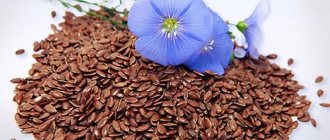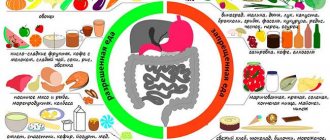Properties of jelly
When soaked, the seeds produce mucilage. It is this that gives the jelly the necessary consistency, allowing it to be cooked without starch, and provides the main therapeutic effect.
Benefit
The introduction of such a dish into the daily menu has a beneficial effect on the entire body:
- normalizes the functioning of the digestive tract;
- acting as a sorbent, cleanses the intestines and enhances peristalsis;
- restores intestinal microflora, which has a positive effect on the condition of the skin and immunity;
- cleanses blood vessels, minimizing the risk of heart attack;
- activates metabolism;
- helps prevent overeating and weight loss.
Indications for use
For the use of flax seed jelly, the indications for use are primarily diseases of the gastrointestinal tract.
For the stomach
The secreted mucus plays the role of antacite. It envelops the mucous membrane, protects it from the aggressive effects of stomach acid, soothes the inflammatory process, and eliminates the symptoms of heartburn. Relief occurs after the first dose, within 15 to 20 minutes. In case of exacerbation of gastritis and peptic ulcer, it is prescribed in a ten-day course as a therapeutic diet.
Important! Flax seeds in their pure form are irritating to damaged gastric mucosa. For the treatment of gastritis of any etiology, only jelly is used.
For weight loss
Fiber, entering the intestines, swells, creating a feeling of fullness for a long time. In addition, dietary fiber, passing through the intestines, collects toxins and waste. The therapeutic effect when losing weight is achieved through:
- decreased appetite;
- soft cleaning;
- activation of metabolism.
At the same time, the energy supply of the body does not suffer.
For pancreatitis
Flaxseed jelly has a low glycemic index, which reduces the load on the diseased organ. With its help, vitamin losses during the period of a strict diet are replenished. Weight loss has a beneficial effect on the pancreas. But it should be remembered that such treatment can only be used during remission.
Harm and contraindications
Despite its unique composition and many beneficial properties, the product is not equally useful for everyone.
Absolute contraindications:
- gastric ulcer and pancreatitis in the acute stage;
- cholelithiasis and urolithiasis;
- diabetes mellitus stage 2;
- diarrhea;
- allergic reaction.
During surgery on the intestines, during pregnancy and lactation, moderation in the amount of product consumed should be observed. Excessive exercise can harm the body.
Beneficial features
Flax seed contains many useful substances:
- vegetable proteins;
- polyunsaturated fatty acids (omega-3, omega-6, omega-9) – have a beneficial effect on the immune system, strengthening it and allowing the human body to resist diseases;
- polysaccharides are the basis of the healing mucilage formed during the cooking of seeds; they reduce the destructive effects of toxins;
- phosphorus - makes bones strong;
- phytosterols – substances that regulate cholesterol levels and bring them to normal;
- lignans – characterized by an antioxidant effect and reduce the risks of cancer and cardiovascular pathologies;
- vitamins : D, E, group B and beta-carotene;
- micro- and macroelements : iron, calcium, potassium, magnesium, etc.
As a result of using flax seeds, there are many positive effects on the body :
- anti-inflammatory;
- wound healing;
- pain reliever;
- enveloping (protects the mucous membrane);
- anti-sclerotic (improves the condition of blood vessels).
Also, taking seeds improves the motor and secretory function of the body .
On our website: Buckwheat porridge and gastritis: how to cook it correctly?
How to prepare flaxseed jelly
Flaxseed jelly can be served as a dessert in combination with fruit and berry ingredients. Or used as an independent non-sweet dish. Let's look at the most popular, affordable and healthy cooking recipes with step-by-step instructions.
With fermented milk
The recipe is used to enhance intestinal motility, gently relieve constipation, and restore intestinal microflora. For preparation, they do not use ready-made kefir, but home-fermented milk.
- In a liter of warm milk, stir 4 tablespoons well. kefir or sour cream.
- Leave for 8 hours in a warm place: near a radiator (carefully turning the container), in a yogurt maker, in a slow cooker.
- Pour 30 g of flaxseeds into 500 ml of boiling water and leave for 8 hours, or in a thermos.
- After the time has elapsed, the ingredients are mixed, left for 2 hours, and taken as an addition to food or as an independent dish.
Made from flaxseed flour
In the classic version, the dish is prepared from seeds, which are poured with boiling water.
Attention! If the seed jelly is not thick enough, you can grind the seeds into flour. Such processing will make the final dish more viscous.
This dish differs in consistency from the classic flax seed jelly, but it brings more benefits.
- 1 cup of ground flour is poured with warm water in an amount of 200 ml and stirred thoroughly.
- When the mixture swells, place it on low heat and slowly pour in 300 ml of warm water, stirring continuously.
- After bringing the jelly to a boil, turn it off. If desired, you can add honey, sugar, condensed milk.
Fruit and berry jelly
The sweet dish turns out to be more high in calories, since sugar and starch are used for its preparation. As a filler, you can use whatever is on hand: apples, pears, currants, strawberries, cherries, raspberries.
- 400 g of any berries or chopped fruits are mixed with 100 - 150 g of sugar.
- Add 1500 ml of water, bring to a boil, boil for 5 minutes, then filter.
- Add starch diluted in a separate container in cold water to the resulting decoction (2 tablespoons per 100 ml of water).
- Add 3 tbsp there too. flaxseed flour, remove the pan from the heat and cool.
From flax seeds with chicory
Chicory acts as a hepatoprotective agent in the recipe, cleansing the liver and restoring its functions. For preparation, it is better to take liquid chicory, and take the jelly in a course of 2 weeks.
- Pour the seed flour with hot water at the rate of 3 tbsp. per liter of water and mix thoroughly.
- The mixture is placed on the fire and, stirring, brought to a boil.
- Beat it in a blender for 10 minutes, adding 1 tsp. chicory.
If desired, you can add 1 tsp. honey
Oatmeal-linseed jelly
Has a bactericidal, immunomodulatory effect, reduces blood glucose levels. For preparation, both unrefined oat grains and processed Hercules flakes are used.
- 300g of flakes are poured with 500g of boiling water and left in a warm place for 8 hours.
- The infusion is filtered, the flakes are squeezed out. Add 1 tbsp to the resulting mixture. flax flour.
- Place the pan on the fire and cook until thickened.
- Salt, sugar, honey, cinnamon, and berries are added to taste.
Disadvantages of use
The opinion of medical experts regarding heartburn oil is mixed. Some are inclined to believe that the oil does not reduce the burning sensation, but, on the contrary, intensifies it. Others believe that it is an excellent temporary help. The ineffectiveness of flaxseed products for heartburn is due to the following points:
- a product that has been stored incorrectly and for a long time deteriorates and is filled with carcinogens;
- due to the technology of preparing oily liquid from flax seeds, harmful minerals and soap residues are formed in it, which can increase the burning sensation in the chest;
- Long-term use of this product increases bile production and intestinal motility.
Features of use
The unique composition of flaxseed and the presence of essential protein components are a direct indication for inclusion in the children's diet. You can start complementary feeding from 6 to 7 months, but in limited quantities.
Important! A child's body will benefit only from a dish prepared independently at home from natural ingredients.
Store-bought jelly in briquettes is strictly contraindicated for pregnant and lactating women, as it contains increased amounts of sugar, starch, dyes and preservatives. Breastfeeding women need flaxseed jelly in their diet, but it is important to exclude allergy-provoking additives: red berries, fruits, honey.
Let us consider in detail the permitted age and the maximum amount of product in the table.
| Category | From when is it allowed? | Daily and weekly dose |
| pregnant women | III trimester | 1 glass a day daily |
| nursing | From 6 months | Drink gradually, bringing up to 1 liter. in a day; 2 – 3 times a week |
| children | From 7 – 12 months | Up to 1 year – 200 ml per day; Up to 3 years – 500 ml per day; 2 times per week |
Benefits of flax seeds for gastritis
Flax seeds are useful for treating various forms of gastritis:
- protects the mucous membrane and prevents the adverse effects of rough food;
- calms inflammatory processes and relieves pain;
- stimulates the passage of crushed food through the stomach and intestines, preventing injuries.
Flax seeds for gastritis may have contraindications associated with other diseases or pathological conditions. The remedy cannot be considered a panacea for any form of gastritis.
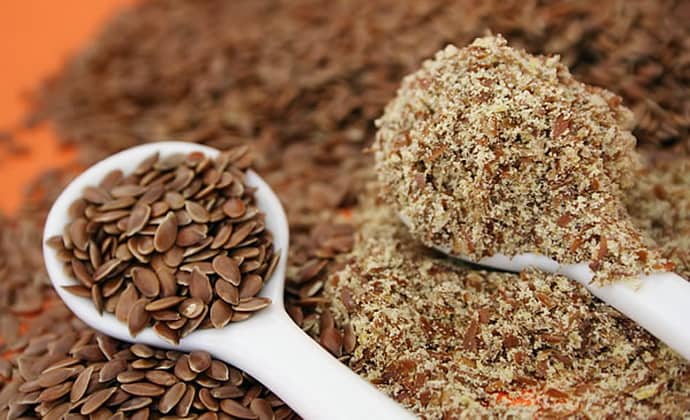
Precautions and contraindications
Kissels, decoctions and infusions of flaxseeds have a pronounced choleretic effect, therefore they are prohibited for any disorders of bile production (hypersecretion). To prevent any side effects, doctors recommend eating no more than 50 g of seeds or flour made from them per day.
Advice! To prevent heaviness in the stomach, bloating, flatulence and other unpleasant sensations, you need to drink 1 to 2 liters of water per day when using flaxseed medicines.
Contraindications include all serious diseases of the liver, pancreas, and gallbladder: pancreatitis, stones, hyperfunction of the gallbladder, hepatitis, allergies.

You should not drink infusions and jelly, or eat dry seeds if you have endocrine diseases, inflammation of the intestines or epigastrium, as well as bleeding disorders.
Pregnant and lactating women are not recommended to eat foods that contain a lot of flaxseeds or oil.
How to store it correctly
The shelf life of jelly depends on the ingredients it contains. Freshly prepared jelly is considered the most useful, so it is not recommended to prepare this dish for future use.
The presence of sugar, natural berry acids, and the use of whole grain components prolong the shelf life of the product. At room temperature it can be stored for no more than 6 – 8 hours. In the refrigerator, the maximum period is 48 hours. If a dish is made from flour or ground grains, the shelf life is halved.
A product containing milk retains good taste and benefits in a cool place for 3 to 4 hours. The same applies to jelly with the addition of oatmeal. Dishes prepared from food concentrates have a longer shelf life, but they lose taste and nutrients.
Contraindications
In addition to treating many diseases of the digestive system, there are indications for which the use of flaxseed is prohibited:
- intestinal obstruction;
- obstruction resulting from intestinal volvulus;
- stone disease of the kidneys, gall bladder and bladder;
- inflammation of the pancreas;
- Flax kernels should be consumed with special caution:
- with a tendency to allergic reactions;
- during pregnancy can cause spontaneous abortion;
- During breastfeeding, increased gas formation is possible.
For any pathological phenomena in the body, consult your doctor before treatment with traditional medicine.
Recipes for making jelly from flaxseeds
An infusion of flax seeds and flaxseed flour has an intense effect. It should not be taken for chronic diseases of the stomach with damage to the walls. However, for completely healthy people this version of jelly is ideal.

Ingredients:
- two tablespoons of flaxseed;
- a tablespoon of flaxseed flour;
- a glass of hot water.
- Pour flaxseed into a glass of hot water, but not boiling water.
- Cover with a warm towel and leave to swell for 8-10 hours. You can do this in a thermos and leave it overnight.
- After the required time, strain the infusion through a sieve.
- Add flaxseed flour, stir thoroughly.
- Drink flaxseed jelly 20-30 minutes before meals, warm, half a glass.
A very simple version of jelly made from flaxseed flour is a universal therapeutic and health remedy. The drink helps to get rid of excess weight, gives lightness and a comfortable feeling to those who have intestinal problems.
Ingredients:
- one and a half tablespoons of flaxseed flour;
- half a liter of water.
- Stir flaxseed flour in water at room temperature.
- Place a pan of flaxseed water on the fire and bring to a boil.
- As soon as the liquid boils, turn off the heat.
- Cool the jelly until warm.
- Drink as usual: a glass half an hour before your first meal.
How to take flax seeds for heartburn?
Flaxseed for heartburn can be taken by adding to cereals, sauces for dressing vegetable salads, first courses, desserts, and baked goods. Many people prefer to chew it in its pure form with water. In order for the product to bring benefit and not harm, you need to start with small doses (10 g) with a gradual increase. The maximum daily dose should not exceed 30 g.
But most often the seeds are used as raw materials for preparing medicinal drinks (decoctions, infusions), since they are most effective in combating this unpleasant phenomenon. It is recommended to take them after meals. There should be at least 30 minutes between meals and the medicinal product. You need to drink 200 ml of the drink per day, dividing it into 3 doses. Treatment should be carried out only with freshly prepared products. The shelf life of cooked seeds is no more than a day.
It is better to use water extracts after consultation with a doctor, since a discomfort in the chest may be a sign of a dangerous disease.
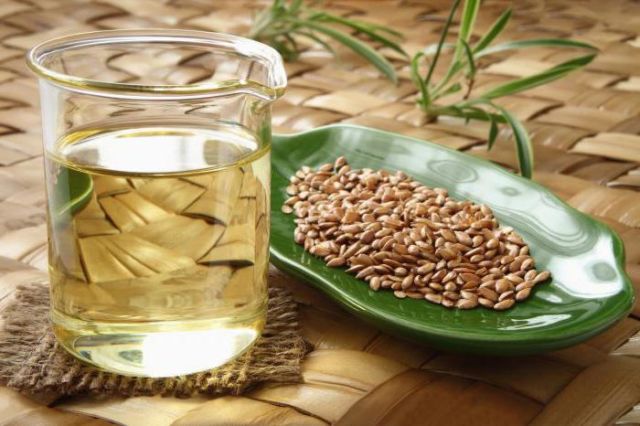
Flax seeds are best taken as a decoction.
Possible harm and contraindications
Despite numerous beneficial properties and great value in folk medicine, the seeds of a medicinal plant can be harmful if you do not follow the rules for taking products based on them and do not take into account contraindications.
Excessive use of home remedies can lead to an increase in the blood of the steroid hormone estrogen, which negatively affects the functioning of all systems of the human body, and especially women. Improper use of medications prepared from flax seeds can cause iodine deficiency, since they contain substances that impair the absorption of iodine by the body.
It is important to take into account the fact that low-quality raw materials (expired or improperly stored) contain oxidized fats, which have a harmful effect on the human body.
It is strictly forbidden to take seeds if you have an individual intolerance to the substances included in their composition. You should not use the product if you have chronic liver pathologies of various etiologies and symptoms, hypocoagulation (poor blood clotting), or severe gynecological diseases. It is contraindicated to use products from the seeds of a herbaceous plant for medicinal purposes for people suffering from IBS (irritable bowel syndrome), as well as various diseases based on dysfunction of the endocrine glands.
Flaxseed should not be used if there are calculi (stones) in the organs of the urinary system, the gallbladder and its ducts. Oilseeds are plants whose consumption is contraindicated in case of insulin-dependent diabetes and pregnancy. It is not recommended to use it for such a pathological condition of the digestive tract as intestinal obstruction. The drug is not suitable for patients with elevated calcium concentrations in the blood plasma.
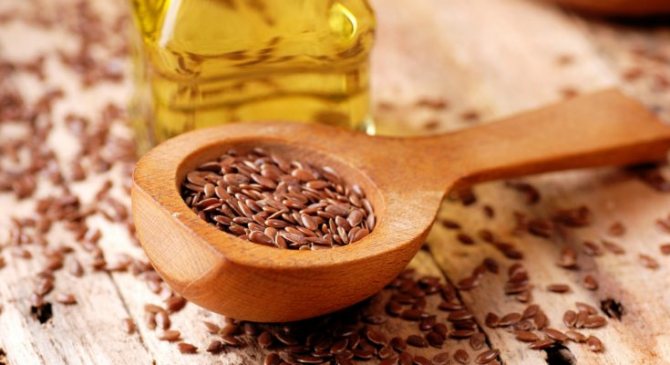
There are a number of contraindications to taking flax seeds
Flaxseed for different types of gastritis
According to medical statistics, gastritis now affects about 80-85% of the population. Pain in the stomach, a feeling of heaviness, nausea, vomiting, heartburn, abnormal bowel movements - these unpleasant symptoms signal that the gastric mucosa is inflamed and it’s time to take action.
The main indicator of stomach health is acidity - the concentration of acid in the gastric juice.
According to the type of acidity, they are distinguished:
- Gastritis with low acidity;
- Gastritis with high acidity.
Note: The amount of acid in gastric juice is measured in pH - conventional units. In various parts of the stomach, pH fluctuations from 1.5 to 7.4 are considered normal.
- Gastritis with low acidity is characterized by difficulty digesting food, since acid is involved in the breakdown of protein. Poorly digested food rots and ferments inside the body, causing flatulence, belching, and bad breath. A decrease in acidity also creates favorable conditions for the growth of malignant tumors.
Treatment of gastritis with flax seeds will help improve digestion, remove accumulated toxins and restore normal functioning of the entire digestive system.
- Gastritis with high acidity is characterized by increased acid production, which irritates the gastric mucosa and leads to its inflammation. This process causes pain associated with eating, heartburn, and vomiting. Increased acidity can lead to the development of gastric ulcers.
Flax seeds for gastritis with high acidity will be useful for their enveloping properties. These properties will protect the walls of the stomach from irritation, reduce pain, and prevent the formation of ulcers and erosions.
What are the benefits of flaxseed porridge?
Numerous studies of flax seeds have confirmed that they have an impressive supply of nutrients that help eliminate gastrointestinal pathologies. As soon as the disease goes into remission, flaxseed porridge for gastritis is gradually introduced into the diet.
The benefits of flax seeds are invaluable. They help to quickly relieve inflammation, which is especially important during treatment. They also saturate the body with useful substances and vitamins. Regular consumption of flaxseed porridge promotes recovery, puts the digestive system in order, improves the functioning of the immune system and strengthens the body.



